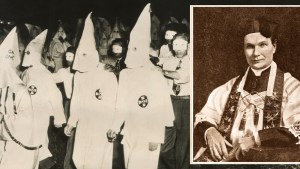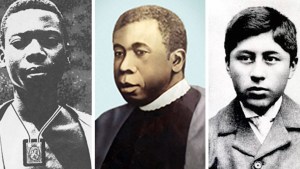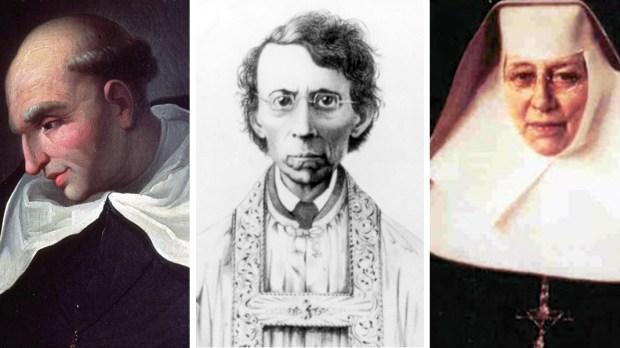It’s important to recognize those saints who experienced racism, but people seeking to support those who suffer from discrimination need to move beyond compassion to action. We can find inspiration in the lives of saints who fought (often at great risk) to bring about a world where oppressed people were able to live in freedom. For some, it was a matter of systemic change. Others were called to serve individuals rather than attempting to restructure systems of injustice. But every one of them served from a certainty of the absolute dignity of every human person. Through their intercession, may we do the same.
Servant of God Bartolomé de las Casas (1484-1566) was a Spaniard living in the West Indies and Mexico who worked for 50 years to end the enslavement of Native American peoples, advocating to the Spanish crown that they be permitted to rule themselves. Though he had been a slave owner himself (even as a priest), he was struck by the Christmas Eve sermon of Antonio de Montesinos, in which the good friar condemned the leading citizens of Santo Domingo for holding slaves. Las Casas said hearing Montesinos was a pivotal point in his life, setting him on a course which made him the first great advocate of the rights of native peoples in the New World. Initially, he supported the enslavement of Africans, but ultimately rejected all forms of slavery, saying, “I came to realize that Black slavery was as unjust as Indian slavery … and I was not sure that my ignorance and good faith would secure me in the eyes of God.” As bishop in Mexico, he refused absolution to slave owners even on their deathbeds unless they freed all their slaves. Las Casas was despised by nearly everybody and much maligned for centuries after his death. He stands as a beautiful witness of gradual conversion and the power of honest self-reflection, a sinful man who became a decent man, then a hero, then a saint.
Venerable Felix Varela y Morales (1788-1853) was a Cuban priest and statesman, a seminary professor whose intellectual contributions to Cuba were so significant that he’s often called, “the one who taught us how to think.” When he was sent as a representative to the Spanish Parliament, Varela took that opportunity to speak out in favor of the abolition of slavery and the freedom of Spanish colonies. He received a death sentence for his trouble, but escaped to New York. There he spent the rest of his life serving immigrant communities (particularly the Irish) and working to form the Catholic Church in America as one that was supportive of immigrants.
Servant of God Niccolò Olivieri (1792-1864) was an Italian priest who was deeply troubled by the institution of slavery. Feeling incapable of effecting societal change, he set about ransoming enslaved people. With the support of the Holy Father (Blessed Pope Pius IX), the financial backing of many cardinals and bishops, and the partnership of St. Mary Euphrasia Pelletier, he began to travel back and forth to Africa to purchase the freedom of enslaved children. In the 25 years of his ministry, he redeemed nearly 1,000 slaves, including Venerable Maria Giuseppina Benvenuti (Zeinab Alif), who went on to become a Poor Clare abbess.
Venerable Antônio José Ferreira Viçoso (1787-1875) was a Portuguese priest and later bishop in Brazil. He wrote frequently in condemnation of slavery. When his insistence that slavery was egregiously evil fell on deaf ears, he tried another tactic, writing, “With Africans, you would do a lot, it is true, but in addition to attracting the wrath of God with this barbarity, it would tie up much capital.” When Blessed Francisco de Paula Victor approached him, hoping to become a priest, Viçoso was undeterred by the fact that Victor had been born into slavery. He even petitioned Rome to allow Victor’s ordination despite his having been born outside of wedlock (a situation that barred one from Holy Orders at the time). Viçoso died before slavery was abolished in Brazil, but his activism paved the way for that development.
St. Katharine Drexel (1858-1955) gave up an enormous fortune and a brilliant future as a socialite to begin a religious order devoted to working with African American and Native American children. She gave up seven million dollars (about $200 million today) and the respect of her peers in order to fight individual and institutional racism, taking a fourth vow “to be the mother and servant of the Indian and Negro races.” And she suffered for it, notably through the opposition of the Klan, whose members once threatened a white pastor at one of the churches where Drexel’s Sisters worked; the Sisters prayed, a tornado hit the Klan headquarters, and the cowards in white hoods kept their distance from the warriors clad in black. The foundress of the Sisters of the Blessed Sacrament, Mother Drexel spent over 60 years traveling the United States in the service of people despised by their country but beloved of God.

Read more:
An American story about an Irish priest, a brave girl, and the KKK

Read more:
Saints who fought racism

